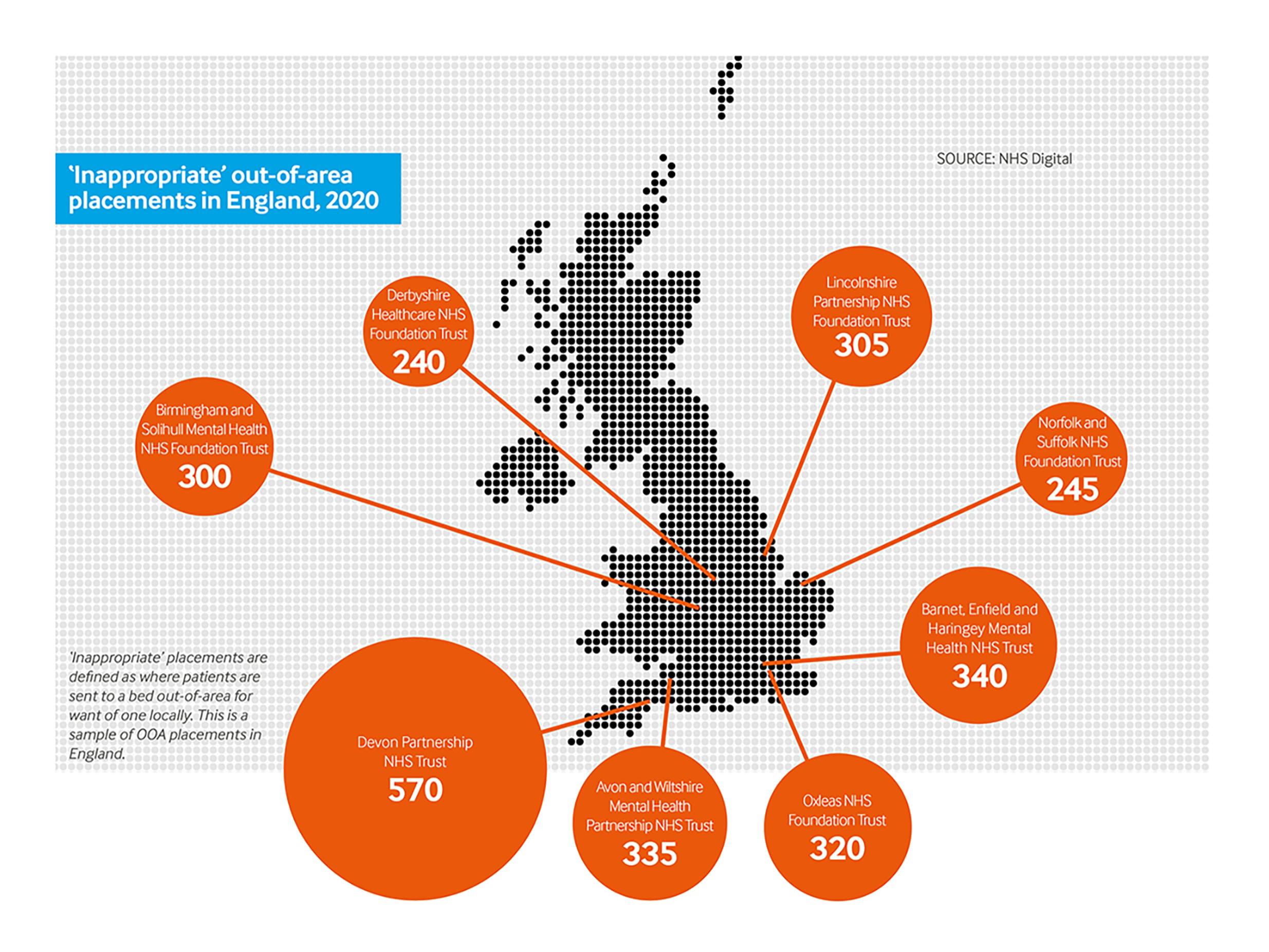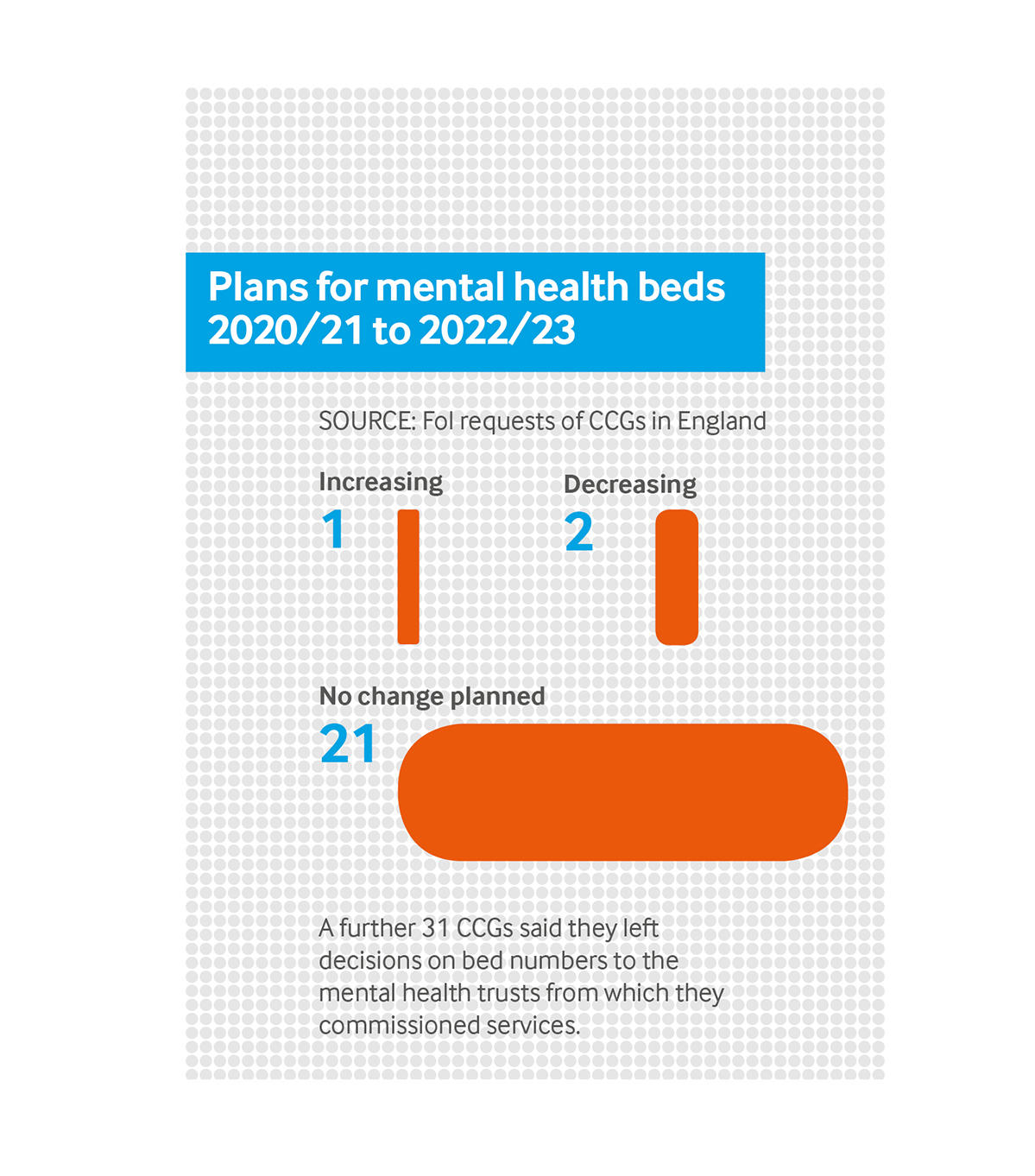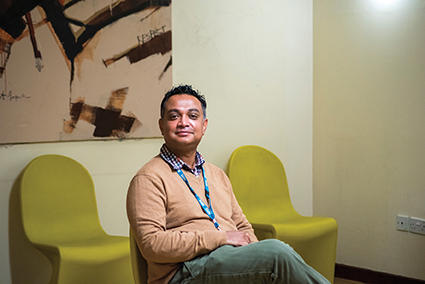Not a single patient from England with acute mental ill health should be in a bed far from home for want of one locally by April, as has been commonly the case in the NHS.
This was the widely welcomed target announced by the then health secretary Jeremy Hunt in 2017 to end the pain of separation from families and NHS carers of patients sent to so-called OOA (out-of-area) beds, an increasing practice back then, as an investigation by The Doctor had revealed months beforehand.
With the deadline looming, and as COVID-19 re-tightens its grip on the NHS, how likely is it to be hit? And what have trusts done to meet it?
The Doctor analysis of NHS figures and responses from FoI (freedom of information) requests indicate it’s almost inevitable that it will be missed and for several years to come. Thousands of patients are still sent out of area.
Almost half (47 per cent) of trusts sent patients out of area 100 or more times in the 12 months to August, show the latest figures from NHS Digital.
Very few of the CCGs (clinical commissioning groups) which fund, and so set, bed numbers plan to increase local bed capacity, responses to FoI requests indicate. Bed numbers in some areas are also under review after being requisitioned for COVID-19 patients, The Doctor has found.
In the longer term, further reductions are inevitable as dormitory wards for multiple patients are converted to en-suite rooms with recently announced Government funding.
BMA mental health policy lead Andrew Molodynski says the time has now come for NHS England to lead a coordinated effort to end OOA placements once and for all.
‘Sending patients OOA is a complex but relatively new problem in the NHS. We weren’t sending people out of area en masse 10 years ago,’ he adds. ‘It’s a result of austerity and the gradual but significant reduction in mental health beds over the past few years.’
Resources needed
The Royal College of Psychiatrists backs calls for extra investment in beds in areas with consistently high numbers of inappropriate OOA placements and persistently high bed occupancy.
‘These priority areas should be given the resources to invest in additional local mental health beds that are properly staffed and resourced, immediately,’ says Billy Boland, chair of the RCPsych’s general adult faculty.
Dr Boland called for dedicated discharge funding for mental health to support patients when they leave hospital.
‘Mental health services will not be immune from the acute pressures of winter and the second wave of COVID-19,’ he adds.
While the BMA supports NHS England’s plan to boost mental health care in the community as a means of ending OOA placements, it’s also calling for more local NHS beds. Eight out of 10 OOA beds occupied by NHS patients are in private hospitals, which have increased bed numbers over recent years as the NHS cut its supply.
Our analysis shows that the number of patients sent to a bed OOA for want of one locally fell by just 8 per cent in the 12 months to August compared with the same period in 2018.
While these so-called ‘inappropriate’ placements fell in most trusts, they increased in 38 per cent of the 40 trusts for which comparable figures are available.

The number of days patients spent in such beds – another NHS measure – fell by just 6 per cent in the same 40 trusts.
OOA placements in BSMHFT (Birmingham and Solihull Mental Health NHS Foundation Trust) and DHFT (Derbyshire Healthcare NHS Foundation Trust) – and eight other trusts – doubled in the 12 months to August compared with the same period in 2017/18.
BSMHFT says it has taken several steps to reduce OOA beds through early intervention, including creating an open-access 24/7 mental health helpline. A plan to address the complexities of ending OOA placements is still in development.
DHFT says its numbers had risen because no psychiatric intensive care beds were commissioned by the NHS in Derbyshire. ‘We are working hard to reduce the length of time that people spend in our inpatient areas to ensure people are supported within a community setting as much as possible,’ a spokesperson adds.
Responses to FoIs indicate that CCGs are not driving an increase in bed numbers to end OOA placements.
The majority said they left decisions on bed numbers to the mental health trusts they commission; 21 said they planned to keep bed numbers the same; two to reduce them; and only one, Devon, the area with the highest number of OOA beds in the country, said it wanted to increase bed capacity.
Avon and Wiltshire Mental Health Partnership NHS Trust has seen its OOA placements increase by 14 per cent to 335 in the 12 months until August, despite opening a new 18-bed ward in Bristol in 2018.
‘We have continued to see sustained demand with greater acuity and complexity among our patients,’ a spokesperson for the trust says. In anticipation of a likely further increase in demand, the trust has appointed a clinical director for ‘right care’ to build confidence in home treatment as an alternative to hospital care, to lead ‘system change’ and support ‘complex clinical decision-making’.
COVID-19 itself has been a double-edged sword for hitting the 2021 target, trusts and psychiatrists say.
While reducing bed numbers, it has forced social and mental health care providers to work together like never before to get and to keep patients out of hospital.
‘A lot of our time is usually soaked up by protracted, bureaucratic processes justifying why this patient can leave hospital, leaving lots of them stuck in hospital because social care providers are unable or unwilling to meet their needs,’ a consultant psychiatrist in one major trust tells The Doctor.
‘But we went through a strange window of a few weeks when we were able to get people into social care without any friction.’
This illustrates that ending OOA beds is not simply a bed problem, he adds. ‘It’s a systemic issue,’ he says. ‘In our city, if we don’t take into account the complete dearth of social housing or appropriate placements for complex mentally ill people then we won’t solve anything.’

Srinivas Naik, consultant psychiatrist at LPNT (Leicestershire Partnership NHS Trust), which has not sent a single patient out of area since March, also found a notable improvement in collaboration. ‘Housing, social care, and the CCG all started changing their timeframes,’ he says.
‘It’s a shame that we had to have a disaster to work out that we could all work together at this level.’
Steps taken by LPNT for COVID-19, including the creation of the urgent mental health care hub to cope with COVID-19, which Dr Naik heads up, has helped keep OOA beds at zero (see below).
The BMA’s Dr Molodynski welcomes the efforts of psychiatrists and trusts to reduce OOA placements but calls for a new plan to end them once and for all.
‘It’s clear that further action is needed to end this harmful practice,’ he adds.
‘The pressures of COVID-19, the financial uncertainty faced by the NHS and the country, and the prospect of an economic recession makes it even more important to get a grip on this.
‘We need a more coordinated response from NHS England on beds supply for acutely unwell patients and an immediate moratorium on any further reductions in NHS beds.’
Ending OOA placements
 NAIK: 'It's a shame we had to have a disaster'
NAIK: 'It's a shame we had to have a disaster'
Leicestershire Partnership NHS Trust’s efforts to end OOA placements pre-COVID-19 focused on housing, homelessness, and social care.
It commissioned ‘very short-term’ accommodation from Action Homeless in Leicester, a housing association, for people who need extra support before returning home.
An expansion in its home treatment team has reduced informal admissions and helped people leave hospital sooner.
For the pandemic, it set up in April a round-the-clock urgent mental health care hub for people of all ages. This has reduced the proportion of people admitted during a mental health crisis from 20 to 2 per cent, the trust says.
Despite reducing adult acute beds by 40 during COVID-19, it has kept OOA beds at zero by ensuring every admission goes through a consultant psychiatrist.
Patients can be kept overnight at the hub for review by senior psychiatrists.
Consultant psychiatrist Srinivas Naik hopes the measures set up during COVID-19 will keep going. As one of 20 or so trusts to receive a chunk of the £400m to convert dormitory wards, there’s an extra imperative to do so, he says.
‘We are likely to lose further beds because of the designs,’ he says. ‘So we need to prepare as a service to work with fewer beds.’

